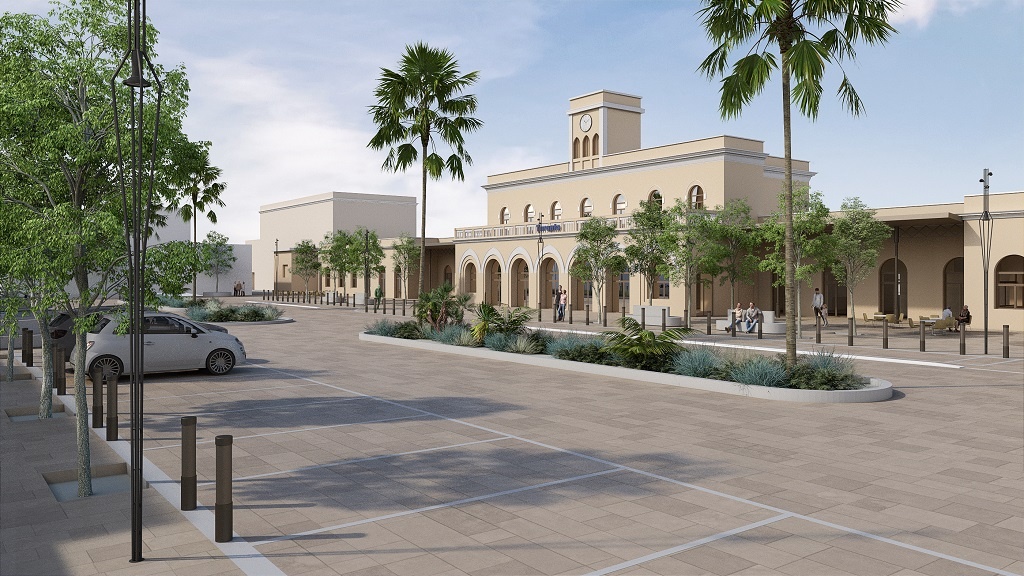Under the impetus of RFI, Taranto station is preparing its transformation: its layout will be radically transformed with the arrival of a Bus Rapid Transit (BRT) network and the integration of soft modes.
A new passenger building will be erected next to the existing station, connecting with the Croce Terminal bus station, and a new park-and-ride facility will be built nearby. The road network will be redesigned to include a subway for pedestrians, green spaces, new low-energy lighting, high platforms for bus access and wider cycling areas.
Four environmental certifications for a sustainable ambition
RFI has adopted high sustainability criteria to assess the performance of the infrastructure, using four certification systems:
- LEED (Leadership in Environmental and Energy Design) certification: this American certification, developed by the US Green Building Council, aims to promote the high environmental quality of buildings, and has an evaluation scale specifically dedicated to transport*.
- The Envision Protocol, an assessment system created in the United States by the ISI (Institute for Sustainable Infrastructure) for sustainable infrastructure projects. It is promoted in Italy by ICMQ, one of the main certification bodies in the construction sector**.
- Compliance with the DNSH (Do No Significant Harm) principle, which derives from European taxonomy, the central feature of the action plan for sustainable finance***.
- And CAM (Criteri Ambientali Minimi) certification, which sets the minimum environmental criteria to be applied to every public infrastructure construction project in Italy and promotes the growth of the circular economy****.
Our design deliverables as well as the construction work will be inspected against these certifications so that the future multimodal terminal can obtain them.

More than just another transport project, Taranto’s multimodal station is the emblem of a modern programme to transform existing infrastructure into sustainable buildings, with the highest standards of sustainability in both design and operation. Delivery of the buildings and the new multimodal facilities is scheduled for 2026.
Roberto Lodola, Project manager, SYSTRA Italy

Taranto, a city fighting pollution
Taranto is one of the most polluted cities in Europe. Its regional area is made up of petrochemical and steel industrial zones, which have been criticised for their discharges into the environment.
In addition to its sustainable certifications, the redevelopment of the station, designed entirely using BIM, focuses on optimising the use of land, protecting resources, particularly water by preserving local hydrology, landscaping to minimise visual impact, and reducing construction waste.
* LEED BD+C v4 Transit (Building Design and Construction) is the most suitable certification for transport infrastructure projects.
** RFI has released a Guidelines document and a Technical Specification that aim to decline the ‘official’ manual for the application of the Envision Protocol, within the scope of interventions related to railway stations.
*** In European taxonomy, the DNSH principle requires economic players to cause no harm to the 6 environmental objectives that determine the sustainability of an activity, in particular the preservation and ease of restoration of biodiversity, the objectives for the use of infrastructure, and its financing, in accordance with Article 5 of the ‘Horizontal Principles’, which state that ‘Subsidies shall only finance measures that respect the DNSH principles of no significant harm’.
**** The latest update of the CAM regulations, on 6 August 2022, is based on the principles and development models of the circular economy, in line with the most recent directives on the subject, in particular Communication COM (2020) 98: ‘A new plan of action for the circular economy. For a cleaner and more competitive Europe.’
 Australia
Australia  Brazil
Brazil  Canada
Canada  China
China  Denmark
Denmark  France
France  India
India  Indonesia
Indonesia  Ireland
Ireland  Italy
Italy  Malaysia
Malaysia  New Zealand
New Zealand  Norway
Norway  Poland
Poland  Saudi Arabia
Saudi Arabia  Singapore
Singapore  South Korea
South Korea  Sweden
Sweden  Taiwan
Taiwan  Thailand
Thailand  United Kingdom
United Kingdom  United States
United States  Vietnam
Vietnam 





